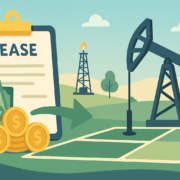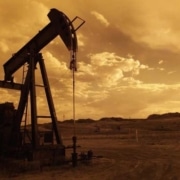A paid up oil and gas lease is a common lease structure where the lessee (the company leasing the minerals) pays the consideration for the lease up front, rather than making annual “delay rental” payments during the primary term. The structure can simplify administration and reduce missed-payment issues, but it also changes the timing of cash flow and can affect how you evaluate the offer.
This guide explains what a paid up oil and gas lease is, why operators use it, how it compares to alternatives, and the clauses that typically drive the real economics—especially the oil and gas lease signing bonus and the language that governs mineral rights lease royalties.
⚠️ IMPORTANT LEGAL DISCLAIMER: The information provided on this page is for general informational purposes only and does not constitute legal, financial, or investment advice. Oil and gas laws, mineral rights regulations, and royalty structures vary significantly by state and jurisdiction. While we strive to provide accurate and up-to-date information, no guarantee is made to that effect, and laws may have changed since publication.
You should consult with a licensed attorney specializing in oil and gas law in your jurisdiction, a qualified financial advisor, or other appropriate professionals before making any decisions based on this material. Neither the author nor the publisher assumes any liability for actions taken in reliance upon the information contained herein.
Key takeaways
- A paid up oil and gas lease usually eliminates annual delay rentals by folding that value into the up-front consideration paid at signing.
- “Paid up” changes payment timing; it does not guarantee drilling. Whether acreage can be held without development depends on the primary term and the lease’s holding clauses.
- For most lessors, the biggest economic levers are the oil and gas lease signing bonus, the royalty rate, and how the royalty clause handles pricing and deductions.
- The paid-up lease vs delay rental lease comparison is mainly about timing and risk: one larger up-front amount versus smaller periodic payments.
- Protective provisions—pooling limits, Pugh and depth clauses, shut-in limits, retained acreage, and continuous development—often matter as much as the headline bonus.
What is a paid up oil and gas lease?
A paid up oil and gas lease is an oil and gas lease that remains effective for the primary term without requiring separate, periodic delay rental payments. In older or more traditional forms, the lessee could keep the lease alive during the primary term by paying annual delay rentals if it had not started drilling or “operations.” In a paid-up structure, the value of those rentals is typically paid up front (or the lease is written so that no rentals are due at all), and the lease stays in force for the entire primary term unless it terminates for another reason stated in the lease (for example, failure to pay a required bonus draft, breach of a condition, or other termination provisions).
People sometimes use “paid up” loosely, so it helps to separate three different concepts that often appear in the same conversation:
- Bonus (consideration) paid at signing: the money paid for executing the lease—often quoted as dollars per net mineral acre. This is commonly called an oil and gas lease signing bonus.
- Delay rentals: periodic payments that may keep a lease alive during the primary term without drilling (if the lease form uses delay rentals).
- Royalties: ongoing payments tied to production and sales once a well is producing; these are the mineral rights lease royalties defined by the royalty clause.
If you want a quick definition, see our glossary entry on paid up oil and gas lease. For broader lease context, review Oil and Gas Lease for Dummies and our guide to oil and gas lease negotiation.
If you are sorting through competing offers and want help spotting the clauses that change the economics, you can contact our team to discuss the documents and the questions to raise with your attorney and advisors.
Why operators use paid up leases
Operators and leasing teams use paid-up structures for a few recurring reasons:
- Administrative simplicity: fewer annual checks, fewer tracking errors, and fewer disputes about whether a rental was timely.
- Lower lease-termination risk from missed rentals: in some lease forms, a missed rental payment can trigger termination. Paying up front can reduce that risk for the lessee.
- Speed of acquisition: a larger up-front payment can help consolidate acreage faster in competitive areas.
- Budget alignment: concentrating costs up front can match an acquisition budget or a specific leasing window.
From a lessor’s standpoint, a paid up oil and gas lease can be attractive because it provides cash now. The tradeoff is that the lessee may have a longer runway to hold the lease without drilling (depending on the term and holding clauses). That is why the best review focuses on the entire contract, not just the up-front payment.
Paid-up lease vs delay rental lease
The phrase paid-up lease vs delay rental lease describes two ways to handle the same primary-term question: what happens if drilling does not start right away?
| Feature | Paid-up lease | Delay rental lease |
|---|---|---|
| Primary-term rentals | No annual rentals; consideration paid up front | Annual rentals may be due if operations have not begun |
| Cash timing | More cash at signing (often includes prepaid rentals) | Smaller up-front bonus, then rentals over time |
| Missed-payment disputes | Reduced (no annual rental deadline) | More likely if rentals are required and missed |
| Drilling incentives | Driven mainly by geology, economics, and lease holding clauses | Driven mainly by geology, economics, and lease holding clauses |
| Modern usage | Very common | Still used in certain markets and legacy lease forms |
Neither structure is automatically “better.” What matters is the complete package: the bonus, the primary term length, and the clauses that control how acreage can be held. In other words, the paid-up lease vs delay rental lease distinction is often secondary to the terms that determine whether the lease can be held with minimal activity and how mineral rights lease royalties are calculated once production begins.
How the money flows in a paid up lease
1) The oil and gas lease signing bonus
An oil and gas lease signing bonus is the up-front consideration paid to the lessor for granting the lease. It is commonly expressed as a dollar amount per net mineral acre (for example, “$X per NMA”), though structures vary by state and market. In a paid up oil and gas lease, the bonus is often emphasized because the lessee does not plan to make additional annual rental payments.
Bonus terms worth reading closely include:
- Net mineral acres and proportionate reduction: many leases include a “proportionate reduction” clause that reduces payments if the lessor owns fewer acres than represented. That can be appropriate, but the math should be transparent.
- Payment timing and delivery: some offers pay on execution; others pay by bank draft after title review. Make sure the lease does not become effective (or recorded) without a clear obligation to pay within a defined timeframe.
- Title warranty language: many lessors prefer to limit or disclaim warranty of title to avoid unintended liability.
2) Delay rentals and why paid-up deals avoid them
Delay rentals are periodic payments that allow the lessee to keep the lease in force during the primary term without drilling. In a paid-up structure, delay rentals are typically eliminated. The lessee either pays a larger up-front amount that reflects the value of those rentals, or the lease form simply does not require rentals.
3) Mineral rights lease royalties
Mineral rights lease royalties are the percentage of production revenue (or production itself, depending on the clause) paid to the lessor once a well is producing and the oil or gas is sold. The royalty clause is often the most important long-term economic term in any lease because it affects every unit of production throughout the life of the well(s).
For a deeper explanation of royalty mechanics and check detail, see Oil and Gas Royalties: The Complete Guide. For the basics of what is being leased (and what can be separated or transferred), see What Are Mineral Rights?
Primary term, secondary term, and how a lease is “held”
Most oil and gas leases have two major phases:
- Primary term: a fixed period (often 3–5 years, sometimes longer) during which the lessee has the right to explore and drill. In a delay rental lease, the lessee may keep the lease alive during this term by paying rentals if it has not begun operations. In a paid up oil and gas lease, there are usually no rentals due.
- Secondary term: the period after the primary term when the lease continues only if certain conditions are met—typically “so long as” oil or gas is produced in paying quantities, or the lessee is conducting continuous operations as defined in the lease.
When a lease is “held,” it means it remains in effect and prevents the lessor from leasing the same minerals to a different operator. A paid-up structure can make it easier to hold the lease through the primary term because rentals are not a termination trigger. For that reason, clauses that limit acreage held by production or require ongoing development can be especially important.
Clauses that usually matter most in a paid up oil and gas lease
Royalty clause language and deductions
A royalty rate is only half the story. The royalty clause also defines the pricing point and whether post-production costs may be deducted before calculating royalties. Terms like “market value at the well,” “at the wellhead,” “net proceeds,” or “gross proceeds” can materially change net payments. This is a frequent source of confusion in mineral rights lease royalties, especially in gas-prone areas where gathering, compression, processing, and transportation costs can be significant. Because these terms are contract-specific and can interact with state law, many lessors have an attorney review the royalty clause language before signing.
If you want an academic overview of why royalty clause language matters, the University of Wyoming College of Law has a public paper discussing royalty clause interpretation and cost allocation (external): The Royalty Clause in an Oil and Gas Lease.
Pooling and unit size
Pooling allows the lessee to combine multiple tracts into a drilling or production unit. Pooling can be necessary for modern horizontal development, but unit size and pooling authority can affect your share of production and how much acreage is held. Some leases include pooling limits (such as maximum unit size for horizontal versus vertical wells) or require notice before pooling.
Pugh clause and depth severance (horizontal and vertical protection)
A Pugh clause is designed to prevent all leased acreage from being held by production from a small portion of the tract. A “horizontal” Pugh clause releases non-producing acreage outside the producing unit after the primary term. A “vertical” Pugh clause (often implemented as a depth severance clause) can release depths below or above producing formations.
In a paid up oil and gas lease, these clauses can be especially important because the lessee already has the primary-term runway paid for. Without retained acreage and depth limits, one well may hold large blocks of acreage and multiple formations for years, even if additional development does not occur.
Continuous development and retained acreage
Some leases include continuous development requirements (for example, a new well must be commenced within a certain number of days after completion of the prior well) or a retained acreage clause that limits how many acres may be held per producing well after the primary term. These provisions can align incentives and reduce the chance that large blocks are held indefinitely with minimal activity.
Shut-in royalty and cessation of production
A shut-in clause allows a lease to remain in force when a well is capable of production but is not currently selling (for example, due to pipeline constraints or temporary market issues). The clause typically requires a shut-in payment to the lessor. Details to watch include the payment amount, frequency, maximum shut-in period, and what qualifies as “capable of production.”
Surface use and damage terms
Even if your focus is lease economics, surface-use terms can be highly consequential. Surface protections may include well-site location limits, road and pipeline placement standards, water use restrictions, restoration requirements, and damage payments. In some states, surface access is heavily influenced by statute and case law, so local legal guidance matters.
Title, curative, and payment mechanics
Many paid-up deals are presented with a lease form and a promise to pay once title is confirmed. Pay attention to when the lease becomes effective, what happens if title defects exist, and how the bonus is adjusted. Some lessors use escrow or conditional delivery so the executed lease is not delivered or recorded until payment is made.
A practical framework for evaluating an offer
Because every state and basin has its own norms, there is no single “right” paid-up offer. Instead, use a structured review that separates what is certain from what is contingent:
Step 1: Confirm what you own
Before comparing any numbers, confirm mineral ownership and net mineral acres. If you are not sure what you own, start with What Are Mineral Rights? and consult your deed, probate records, or a title professional. Ownership and acreage drive every payment calculation.
Step 2: Separate bonus from royalty economics
The oil and gas lease signing bonus is immediate (once paid). Royalties are contingent on drilling, production, commodity prices, and the lease’s cost and pricing language. Two offers with the same bonus can produce very different outcomes if the royalty clause handles deductions differently.
Step 3: Stress-test term and holding clauses
Ask: How long can the lessee hold the lease without drilling? What happens if a single well is drilled—does it hold all acreage and all depths, or only a defined unit and formation? This is where the paid-up lease vs delay rental lease question becomes less important than whether the lease has meaningful release mechanisms after the primary term.
Step 4: Look for asymmetry and “silent” risks
Common examples include broad pooling authority, minimal development obligations, long shut-in periods, or royalty clauses that allow extensive deductions. These items can be easy to miss because they often sit in boilerplate. If your offer package includes exhibits, addenda, or surface-use agreements, read them together—the strongest protections are usually found in the addendum.
If the documents feel inconsistent—or you are unsure how a clause changes cash flow, acreage retention, or liability—contact our team and we can help you organize the issues to review with your attorney and advisors.
Common myths about paid up leases
- Myth: “Paid up” means drilling is guaranteed. Reality: a paid up oil and gas lease only changes payment timing. Drilling depends on economics, geology, permits, and the operator’s plan.
- Myth: The biggest bonus always means the best deal. Reality: long-term value often depends on mineral rights lease royalties and cost language, not just the up-front amount.
- Myth: Paid-up leases eliminate disputes. Reality: they can reduce rental disputes, but royalty calculation, deductions, pooling, and title issues can still create disagreements.
Tax and reporting basics for lease bonus and royalty income
This section is general education only. Tax treatment can vary based on the taxpayer and jurisdiction. In many cases, lease bonus income is reported as rental income and royalty payments are reported as royalty income, often shown on Form 1099-MISC by the payor. Some taxpayers may also be eligible for depletion deductions on qualifying royalty income, subject to IRS rules and limitations.
For a high-level IRS overview (external), see: IRS Fact Sheet: Tips on Reporting Natural Resource Income.
When a paid up oil and gas lease may make sense
A paid up oil and gas lease can be a reasonable structure in several situations:
- Competitive leasing areas: where paid-up terms are the market norm and operators are actively leasing.
- Owners who prefer up-front certainty: some lessors prefer immediate cash rather than periodic rentals.
- Administrative simplicity: especially for multi-owner tracts, trusts, or estates where collecting and distributing rentals is complicated.
Potential drawbacks and red flags
- Long primary term with limited release: if the term is long and there is no Pugh, retained acreage, or depth-severance protection, the tract may be held with minimal activity.
- Royalty clause allows broad deductions: a royalty rate can look high while net checks are reduced by costs.
- Overly broad pooling: very large units or unclear allocation language can dilute your share.
- Shut-in clause with long periods: a low shut-in payment can hold a lease for long stretches with little royalty income.
- Unclear payment mechanics: be cautious if the lease can be recorded before payment, or if payment is conditional without clear timelines and remedies.
Negotiation ideas that often improve clarity
Lease negotiations are fact-specific and depend on market leverage, but lessors commonly focus on:
- Royalty language: clear proceeds language and limits on deductions where appropriate.
- Defined unit sizes and pooling notice: practical limits consistent with local development methods.
- Pugh and depth clauses: release of non-producing acreage and non-producing depths after the primary term.
- Continuous development or retained acreage: mechanisms that reduce the chance of long-term holding with minimal drilling.
- Surface protections: reasonable location standards, restoration requirements, and damage terms.
For more negotiation concepts, see Oil and Gas Lease Negotiation: Tips from Mineral Rights Experts. For a plain-language legal overview of how leases generally work, the Texas Bar has a public brochure (external): Oil & Gas Basics for Homeowners.
Frequently asked questions
Is a paid up oil and gas lease the same as a bonus lease?
Not exactly. A paid up oil and gas lease describes the absence of delay rental payments during the primary term because consideration is paid up front (or because the lease form does not require rentals). The up-front payment may include a true bonus plus the value that would otherwise be paid as delay rentals, and people sometimes refer to the whole amount casually as an “oil and gas lease signing bonus.”
Does a paid-up lease mean the lessee cannot extend the lease?
Not necessarily. Some leases include extension options, top-lease protections, renewal clauses, or other rights. Read any option language carefully, including price, timing, notice, and whether extension requires a new payment.
How do mineral rights lease royalties work in a paid-up lease?
The royalty mechanism is generally the same as in other leases: once production is sold, the payor calculates mineral rights lease royalties according to the royalty clause and your decimal interest. The paid-up structure mainly affects primary-term rentals, not the royalty percentage itself.
What’s the biggest difference in a paid-up lease vs delay rental lease?
The biggest difference is timing. In a delay-rental lease, payments may be spread across the primary term if drilling has not begun. In a paid-up lease, that value is typically paid at signing and no later rentals are due—making the paid-up lease vs delay rental lease decision primarily about timing, certainty, and lease-holding mechanics.
Can a paid-up lease be held without drilling?
During the primary term, a paid up oil and gas lease may remain effective without rentals. After the primary term, the lease is typically held by production or operations as defined in the lease (and in some cases by shut-in provisions), subject to any retained acreage, Pugh, or depth-severance clauses.
Is the oil and gas lease signing bonus negotiable?
In many markets, yes. Bonus rates and royalty terms often reflect competition, commodity prices, and the operator’s development interest. However, leverage varies widely by location and timing.
Should I focus more on the bonus or the royalty?
It depends on your goals and risk tolerance. The oil and gas lease signing bonus is immediate and certain once paid. Royalties are uncertain because they depend on drilling, production, prices, and deductions. Many lessors focus on both: improving royalty language and protections while also negotiating a fair bonus.
What should I do if I received an unsolicited paid-up lease offer?
Start by verifying ownership and net mineral acres, then compare the offer to local market terms where possible. Review the royalty clause, term, pooling, and shut-in provisions. Consider getting legal review before signing.
Where can I learn more about leases and royalties?
Helpful starting points include Oil and Gas Lease for Dummies, Oil and Gas Royalties: The Complete Guide, and Selling Mineral Rights: A Complete Guide.
Conclusion
A paid up oil and gas lease can be a straightforward way to structure a lease, and in many areas it is the modern norm. But the up-front amount alone does not tell you whether the deal is favorable. The real economics usually come from the combination of the oil and gas lease signing bonus, the royalty clause, and the protections that determine how the lease can be held over time.
If you would like help comparing offers, understanding the paid-up lease vs delay rental lease tradeoffs in your documents, or clarifying how mineral rights lease royalties may be calculated under a proposed lease, contact our team today.




